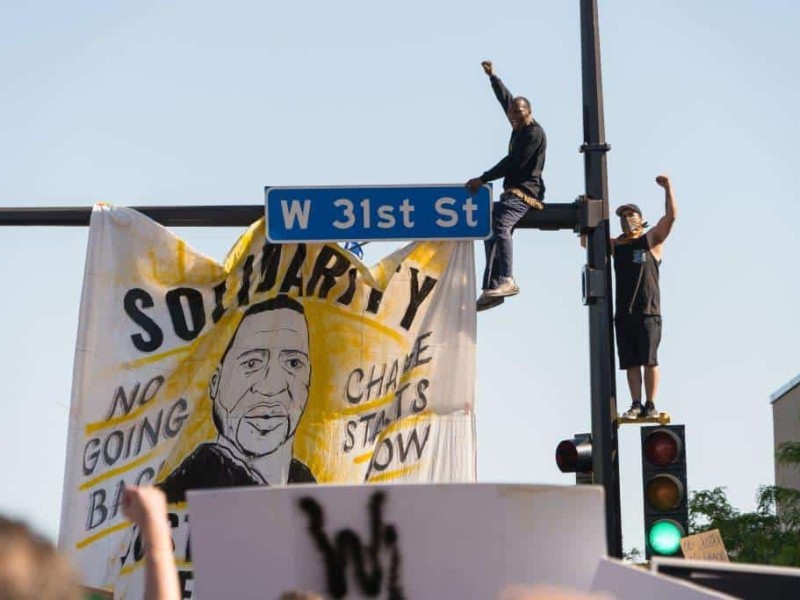Confronting Anti-Blackness in the Latino Community
George Floyd’s death has sparked many conversations about how Black people in the U.S. have been continuously disregarded and shown time and time again that Black lives are treated as if they do not matter.

If the last four years have taught us anything it is that racism and white supremacy are alive and well. And if the past week has taught us anything, it is that a lot of people are still committed to misunderstanding that fact. George Floyd’s death has sparked many conversations about how Black people in the U.S. have been continuously disregarded and shown time and time again that Black lives are treated as if they do not matter. This has also sparked conversations about the allyship of White people and non-Black people of color. So where does the Latino community stand?
There is no way to address this without talking about the anti-Black elephant in the room. This is a conversation that has been spoken about more and more in the mainstream in the last few years but as a collective, we can no longer take our time. Action is required. Solidarity is required, and not the kind that only acknowledges Black people as other, the kind that acknowledges Black people as connected to and part of the Latino community. We as a collective have so much to unpack. Denying our own prejudices does not negate that–it only prolongs the very necessary conversations we need to have in order to move forward.
Many of the same issues we are seeing in the U.S. in regards to anti-Blackness we have also seen throughout Latin America, and even worse, right in our own homes. The denial of this reality is deeply ingrained and unfortunately all too apparent from your favorite telenovela to political agendas and figures, both past and present. The only way to begin to combat anti-Blackness is to have more frequent and more honest dialogue.
Addressing anti-Blackness in the Latinx community means holding up a mirror and looking at the parts of ourselves, our families, our culture that we have denied–the parts that are helping to enforce white supremacy. White supremacy is by definition “the belief, theory, or doctrine that White people are inherently superior to people of all other racial and ethnic groups, especially Black people, and are therefore rightfully the dominant group in any society.” White supremacy is not always overt. White supremacy shows up in why some Black Puerto Ricans checked ‘White’ on the census or the longstanding historical tension between the Dominican Republic and Haiti or why it took so long for Afro-Mexicans to be counted on the Mexican census.
As we continue to dig deeper and hold ourselves and the people around us accountable for the things we do and say, we can be empowered by our differences instead of divided. Discussing anti-Blackness isn’t about blame, it is about undoing legacies of racism. Acknowledging that anti-Blackness exists is step one.
It is also important to acknowledge the intersections of race, ethnicity and nationality which often are conflated. Race and ethnicity are not interchangeable. Latinos can acknowledge and honor the beauty and historical significance of Latinidad that comes in all shades and hair types. To continue to say that we are just (insert nationality/ethnicity) does not honor the very real and very different ways in which different races within said nationality or ethnicity navigate the world. To recognize anti-Blackness, we must recognize the weight of white privilege and how it uplifts those with proximity to Whiteness.
To address colorism and anti-Blackness means to lean into difficult conversations that our community can no longer shy away from. To address the prejudice and discrimination that Black Latinos face we’d also have to question Mami and Papi, Tio, and Abuelita on the anti-Blackness being passed down and normalized from generation to generation. It would mean checking stereotypes and biases at the dinner table and in public. It would mean that we must rally so that these racist ideologies will not continue to be passed down. To choose silence is choosing to be complicit with white supremacy and to stay comfortable, which is a luxury the Black community does not have.
As long as we deny, as long as we deflect, as long as we refuse to question the generations of anti-Black rhetoric, we all will suffer. When we don’t address anti-Blackness we choose to be on the wrong side of history, the side that perpetuates systemic oppression and racism that many in our community experience, but that disproportionately affects the lives of Black people. To continue to leave anti-Blackness unchecked in our communities ultimately sends a very loud message that we only care about equality for some. George Floyd’s murder, as with the many other Black lives that have been lost such as Breona Taylor and Tony McDade, is an injustice for all of humanity. Black lives matter, George Floyd’s life mattered and it is imperative that we recognize that Blackness and anti-Blackness both exist in the Latino community. We must take the time to sit in the discomfort these truths may bring, and we must unlearn. That is true solidarity. That is comradery. That is how you begin to dismantle the system.



